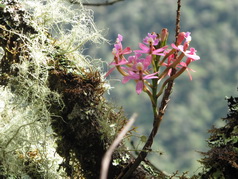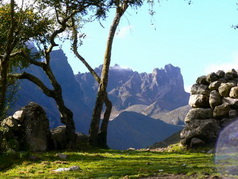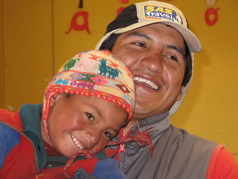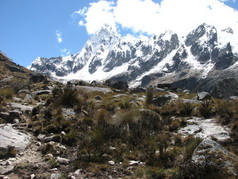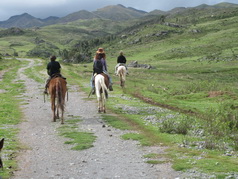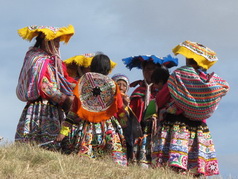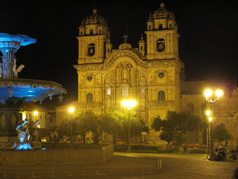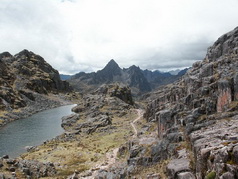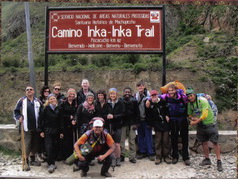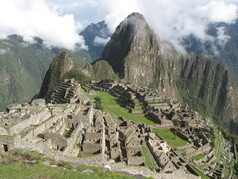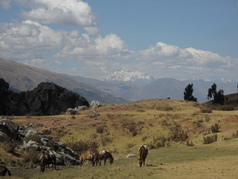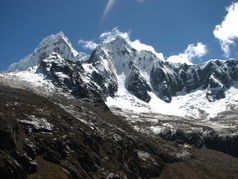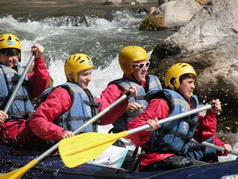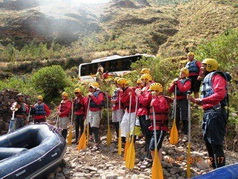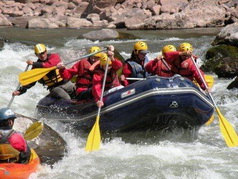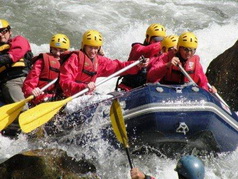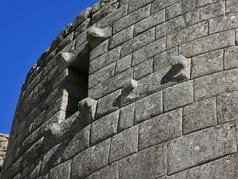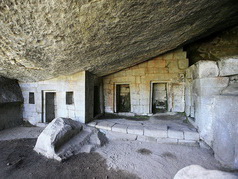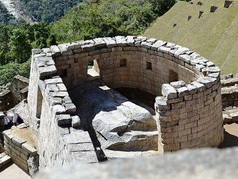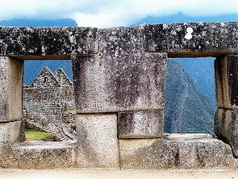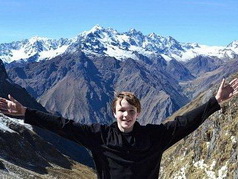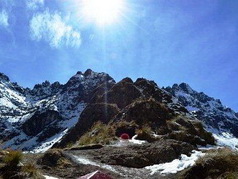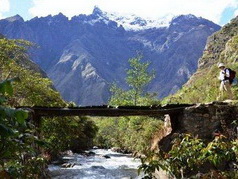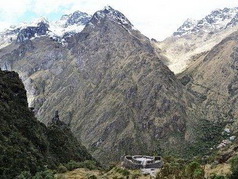
 +51 984 673 124
|
+51 984 673 124
|  +51 984 652 232
| [email protected]
+51 984 652 232
| [email protected]
New Page CLICK here: Join us for the Experience of a Lifetime... !!!
Direct operator & locally owned.Sustainable, responsible & ethical tours since 1990.
Menu
Tours & Destinations

Tours / Programs
- EDUCATIONAL group travel for Schools, Universities.
- LUXURY TOURS -NEW. FAMILY & TAILOR MADE TOURS -Daily Departures. PRIVATE TOURS. 2025, 2026.
- 12 Days Package -EXPLORER. Cusco,Sacred Valley, Choquequirao and Machupicchu. 2025/26
- 9 Days Family Tour. Classic Inca Trail, Sacred Valley, Machupicchu & Cusco. -ADVENTURE DELUXE.
- 7 Days Family Package. Cusco, Pisac & Short Inca Trail to Machu Picchu -DELUXE ADVENTURE.
- 7 Days Family Package. Cusco, Sacred Valley, Vistadome Train to Machu Picchu. -LUXURY TOUR.
- 5 Day De-Luxe Tour. Vistadome Train to Machu Picchu, with Sonesta Valley and Inkaterra Pueblo Hotel. Daily Departures. Book Now!
- MULTI DAYS TOURS with CLASSIC INCA TRAIL TREK. -LIMITED SPOTS. BOOK IN ADVANCE. 2025, 2026.
- CUSCO, Sacred Valley, 5 Day CLASSIC INCA TRAIL, Aguas Calientes and Huaynapicchu Mt. 9 Day Tour Package.
- CUSCO, Sacred Valley, Rainbow Mt hike, 4 Day/ 4 Night Inca Trail Trek with 8 Kg porter. -9 Day Tour Pakage.
- CUSCO Tour, Sacred Valley, RAINBOW Mountain, 4 Day INCA TRAIL . 8 Day Tour Package. NEW.
- CUSCO, Sacred Valley, 4 Day/ 3 Night CLASSIC INCA TRAIL + 8 Kg porter. -7 Day Tour Package.
- CUSCO, Maras, Moray, the Sacred Valley, 4 Day Inca Trail Trek. (-optional a night in Ollantaytambo.) 8 Day Tour Package.
- Cusco, SHORT INCA TRAIL, Colca Canyon, Titikaca Lake. 10 Day Tour Package. Daily Departures.
- SHORT Inca Trail Trek, Cusco & Sacred Valley. 5 Day Tour Package. Daily Departures.
- SHORT Inca Trail Trek, Cusco, Sacred Valley, Humantay Lake, Rainbow Mt hike and Moray. 7 Day Tour Package. Daily Departures.
- AMAZON & MOUNTAINS. Cusco, Sacred Valley, 4 Day Inca Trail Trek & Jungle Trip in Puerto Maldonado. 10 Day Tour Package.
- Cusco, MULTI -ADVENTURES, Sacred Valley, Mt Biking, River Rafting, 4 Day Inca Trail trek. 10 Day Tour Package.
- ESCAPA A LA AVENTURA, Cusco, Rainbow Mountain 1 Day, Short Inca Trail Hike. 5 Day Tour. -Daily Departures.
- LARES TREK & SHORT INCA TRAIL to MACHU PICCHU, Cusco 8 Day/ 7Nights - Available.
- CLASSIC lNCA TRAIL 4 Day Trek & MANU National Park.COMBO. 10 Day Tour Package. (Promotional rate).
- AMAZON JUNGLE TRIP, Cusco, Sacred Valley, Short Inca Trail Trek to Machu Picchu & Puno. 12 Day Tour Package. Daily Dapartures.
- MANU Park, Cusco, Sacred Valley and 4 Day Inca Trail Trek. 12 Day Tour Package. Promotional.
- CONDOR EXPRESS, Cusco, Sacred Valley, 5 Day Inca Trail Trek with Aguas Calientes, Titikaca Lake. 13 Day Tour Package.
- PERU AVENTURA, Lima, Paracas, Ballestas,Nazca Lines, Titikaca Lake, Cusco, Sacred Valley, Short Inca Trail. 15 Day Tour Package.
- MARCA PERU, Cusco, Sacred Valley, 4 Day Inca Trail Trek, Titikaca Lake, Colca Canyon & Nazca Lines. 15 Days Tour Package.
- VIVA el PERU -15 Day Tour (with 5 Day Inca Trail trek with 8 Kg porter service) Group Service.
- AROUND PERU, Cusco, Sacred Valley, 5 Day Inca Trail Trek. Titikaca Lake, Colca Canyon, Nazca Lines, Lima. 18 Days Tour Package.
- PERU WONDERFUL. 4 Day Jungle Trip, Cusco, Sacred Valley, 5 Day Inca Trail, Titikaca Lake, Colca, Nazca, Lima. 20 Days Package.
- PERU AMAZON 18 Day. Lima, Jungle Trip, Cusco, Rainbow Mt, Sacred Valley, Inca trail Trek, Nazca, Paracas, Dunes in Ica.
- EXPLORING PERU & Jungle 21 Day (with 5 Day Inca Trail trek)
- MULTI DAYS TOURS without CLASSIC INCA TRAIL TREK. -DAILY DEPARTURES:
- THE BEST OF CUSCO. (No trek). 4 Days Tour Package. Daily Departures. 2025/ 26.
- AVOID Altitude Sickness. 5 Day Tour -Daily Departures.
- DISCOVER CUSCO. (No trek). 5 Days Tour Package. -Daily Departures.
- ADVENTURE CUSCO, Rainbow Hike, Maras, Moray, Salt Mines,Sacred Valley and Machu Picchu .(No Trek). 6 Day Tour -Daily Dapartures.
- MAGIC CUSCO, Valle Sagrado y Machu Picchu. (No trek). 7 Day Package. Daily Departures.
- CUSCO, Sacred Valley, Machupicchu, Puno, TITIKACA LAKE Floating Islands -7 Day Package.
- THE BEST ADVENTURE Inca Jungle Trek, Rainbow Mountain, Sacred Valley, Cusco. 7 Day/ 6 Night NEW. -Daily Departures !!
- SALKANTAY TRAIL, Sacred Valley, Moray Maras, MACHU PICCHU, HUAYNAPICCHU & Cusco 9 Day / 8 Night. -Available
- AMAZON JUNGLE, Tour Puerto Maldonado & Cultural -Cusco, Sacred Valley and MACHU PICCHU -8 Day Tour
- LIMA,NAZCA LINES,CUSCO, RAINBOW MOUNTAIN, MACHUPICCHU,SACRED VALLEY, MARAS MORAY 11 DAY TOUR.
- EXPLORING LIMA, CUSCO, SACRED VALLEY, MARAS, MORAY, SALT MINES, RIVER RAFTING, MACHU PICCHU BY TRAIN. 9 Days Tour.
- CHOQUEQUIRAO, MACHU PICCHU, SACRED VALLEY, CUSCO 10 Days Tour Package -Daily Departures.
- AMAZON & MACHU PICCHU 10 Day/ 9 Nights. DeluxeTour (No Trek) Daily Departures !!
- EXPLORING CUSCO, SACRED VALLEY, MACHU PICCHU, PUNO & Titikaca Lake.10 Day Tour
- INCAS, ISLAND and CONDOR 12 Day Tour. Cusco, Sacred Valley, Machu Picchu, Colca Canyon in Arequipa, Titikaca Lake, Puno.
- JAGUAR EXPRESS. 14 Day Tour. Lima, Amazon Lodge, Cusco, Sacred Valley, Machu Picchu by Train, Uros, Taquile Titicaka Lake, Puno.
- PERU EXPRESS. 17 Days Tour. Lima, Paracas, Ballestas, Flight over Nazca, Colca Canyon, TitiKaca Lake, Cusco, Machu Picchu.
- PERU PREMIUM -DELUXE. 17 Day Tour. Lima, Paracas, Ballesta, Nazca Lines, Amazon Lodge, Cusco, Machu Picchu w INKATERRA Hotel.
- PERU, BOLIVIA & CHILE. Cusco, Machupicchu, Puno Floating Islands, Copacabana, La Paz, Uyuni Salar, San Pedro Atacama. -14 Day
- PERU & BOLIVIA. Cusco, Sacred Valley, Machupicchu, La Paz, Valley of the Moon, Tiawanaco, Copacabana Puno, Juliaca. -12 Days.
- CLASSIC INCA TRAIL TREKS to MACHU PICCHU. -LIMITED SPOTS. BOOK NOW:
- Inca Trail Classic Trek 4Days/3Nights -Small Group. AVAILABLE on: 2025/26.
- Inca Trail Classic 4Day/3Night -PRIVATE SERVICE Available on 2025/26
- Inca Trail plus Huaynapicchu mountain & Aguas Calientes 5D/4N - Group Service.
- Inca Trail 4Day/4Night with extra night in Aguas Calientes -Group Service.
- Inca Trail & Inkaterra Machu Picchu Pueblo Hotel 5D/4N Aguas Calientes DE-LUXE -Group OR Private Service.
- Sacred Valley tour. Night in Ollantaytambo & Inca Trail 5Day/4Night -Group Service
- Inca Trail Spiritual 5D/4N "PILGRIMAGE" Trek to Machu Picchu -Private Service.
- SALKANTAY Mt and Classic Inca Trail Trek 7Day/6Nights -Private Service
- SHORT INCA TRAIL TREK to MACHU PICCHU 2DAY/1NIGHT in 2025- 2026. -Private and Group Service.
- SHORT INCA TRAIL TREK to MACHU PICCHU with CAMPING 2 Day/1Night -Private Service.
- SACRED VALLEY & SHORT INCA TRAIL to MACHU PICCHU 3 Day/ 2 Night -Group Service.
- Cusco, RAINBOW Mt, Sacred Valley, 1 DAY SHORT INCA TRAIL. 5 Day Tour. -Daily Departures.
- ALTERNATIVE TREKS: TREKS to MACHU PICCHU, SHORT INCA TRAIL -FIXED DEPARTURES.
- Lares Trek + Short Inca Trail 4Day/3Night -Group Service. Fixed Departures. NEW
- Salkantay Trek to Machu Picchu. 5 Day/4 Night -Small Group Service. Confirmed Departs:
- Salkantay Sky Lodge to Lodge to Machupicchu 5 Day/4 Nights Trek. -Daily Departures.
- Salkantay Trek to Machu Picchu 4 Day/ 3 Night -Small Group Tour. Daily Departures:
- Lares ValleyTrek, Machu Picchu 4Day /3Night -Small Group Service. Confirmed Departs
- Huchuy Qosqo hike, Sacred Valley and Machu Picchu. 3Day /2Night.
- Huchuy Qosqo & Machupicchu Hike 2D/1N. "NEW"
- INCA JUNGLE Trek to MachuPicchu. 4 Day/3Night -Daily Departures. BIKING, RAFTING and ZIP LINE.
- Choquequirao Trek & MachuPicchu + HuaynaPicchu Mt. 8 Day/7Nights -Daily Departures. Private Tour.
- Choquequirao Trail 5 Day/4 Night Trek. Daily Departures.
- Choquequirao Trail 4Day/3Night hike. Daily Departures!.
- Ausangate Mountain Trek. Full Loop 6Day/ 5Night plus Rainbow, Red Mountain.
- Ausangate Trek and Rainbow Mountain 4 Day / 3 Night Trek "NEW"
- Huchuy Qosqo Trail 1 Day Trek (Daily Departures)
- Huchuy Qosqo Trek 2 Day/ 1 Night. (without Machu Picchu) -Daily Departures !!.
- MACHU PICCHU TOURS by TRAIN with VISTADOME or EXPEDITION. -DAILY TOURS in 2025,2026.
- Sacred Valley Guided Tour, Aguas Calientes, Machupicchu."COMBO" Tour 2 Day/1 Night -Daily Departures! 2025/26
- Chincheros, Maras, Moray, Salineras and Machu Picchu 2 Day/1 Night. NEW. -Daily Departures
- Machu Picchu Guided Tour "SUNRISE" 2 Day/1 Night -Daily Departures !
- Machu Picchu by Train & Walk to Mandor, Night in Aguas Calientes. "ACTIVE" Tour 2 Day/ 1Night.
- Sacred Valley of the Incas + Machu Picchu. EXPLORERS 3 Day/ 2 Night -DAILY DEPARTURES.
- Machu Picchu DELUXE by VISTADOME with INKATERRA 5 star Hotel. 2 Day Tour. DAILY DEPARTURES.
- MachuPicchu with VISTADOME (De Luxe)Train 1 Day Guided Tour. DAILY DEPARTURES !
- Machupicchu with EXPEDITION train Guided Tour 1 Day. DAILY DEPARTURES:
- SPECIAL Machu Picchu with HIRAM BINGHAM -PERURAIL TRAIN 1 Day Guided Tour. DAILY DEPARTURES
- Entrace Ticket to Machu Picchu Citadel. (Machu Picchu Llaqta) -1 Day 2025 -DAILY.
- Tickets for Machupicchu & Huaynapicchu. 1 Day
- Mountain Lodge to Lodge Salkantay-MachuPicchu.
- CUSCO'S Soft HIKES, RAINBOW Mountain, HUMANTAY Lake, River Rafting, Mt Biking, Horse Riding.
- RAINBOW Mountain / Montaña de Colores (Vinocunca) Full Day. Daily Departures !!!
- RAINBOW Mountain 2Day/1Night Trek. (Montaña de Colores) -Daily Departures !!!
- HUMANTAY Mountain 1 Day Hike. Daily Departures
- PALCCOYO Mountain, Stone Forest -Full Day Tour -Daily Departures
- 2 Day/1 Night Horse back riding Inkatambo-Chakan- Waypo Lake-Chincheros.
- River rafting and Mountain Bike 2 Day/1Night -Daily Departures !
- River Rafting 1 Day Urubamba
- Horse Back Riding 4 Ruins (4Hrs)
- Horse Back Riding Mystic (4hrs)
- Mountain Biking Moray & Salt mine
- Mountain Biking Pisac Huambutio
- Mountain Biking Qenqo 5 hours
- TOURS in CUSCO and AROUND, The SACRED VALLEY, Maras, Moray, Salt Mines, South Valley, Saqsawaman, Coricancha.
- CUSCO -City Tour. Saqsawaman, Kenqo, Tambomachay, Pucapucara,Cathedral & Koricancha. -Group and Private Service.
- SACRED VALLEY Tour. Pisac, Ollantaytambo, Chincheros. Daily Departures. Group Tour.
- SACRED VALLEY TOUR, MARAS, MORAY, THE SALT MINES, PISAC. CHINCHEROS. PRIVATE TOURS.
- Moray, Maras & Salt mines Guided Tour. Daily Leavings. -Group Service.
- Moray, Maras, Salt-Mines & Chincheros -Daily Departures -Private Service.
- SKYLODGE in the Sacred Valley -DAILY SERVICE.
- Tipon & SOUTH VALLEY TOUR.
- EXTENSION TOURS:Colca Canyon, Titikaca Lake, Nazca Lines, Ballestas Islands,Paracas, Ica Dunes -DAILY DEPARTURES
- Titicaca Lake Islands Puno 4 Day/ 3 Night Tour. Leaving from Cusco and returning to Cusco. Daily Departures.
- The HIGHEST Navigable Lake and DEEPEST Canyon in the World. 7 Days/ 6 Nights. -Leaving from Cusco, Puno and ending in Arequipa.
- Titicaca Lake Islands Puno 4 Days/ 3 Nights Tour. Starting from Juliaca Airport and ending in Cusco. Daily Departures..
- Titikaca Lake Island Tour -Puno 3 Days/ 2 Nights -Leaving from Cusco and return to Cusco.Daily Departures.
- Titicaca Lake Islands 3 Days / 2 Nights from Cusco ends Puno with full day visit to Uros and Taquile Islands
- Titicaca Lake Islands Puno 3 Days / 3 Nights (from Cusco ends at Juliaca Airport in Puno.)
- Titicaca Lake Islands Puno 3 Days / 2 Night from Cusco (end in Puno)
- 2 Days / 1Night. -Uros, Amantani and Taquile Islands Titikaca Lake Tour. Start from Puno. Daily Departures.
- Uros & Taquile Islands 1 Full Day Tour Lake Titikaca. (Start from Puno.)
- Half Day Uros Islands tour. (Start from Puno.)
- COLCA CANYON Guided Tour. 1 Day -Daily Departures.
- COLCA CANYON TREK 3 Day/2 Nights -Daily Departures !!!
- Colca Canyon 2 Day/1 Night tour. From Puno to Arequipa. Daily Departures.
- Colca Canyon 2 Day/1 Night Tour -From Arequipa to Puno. Daily Departures.
- COLCA CANYON 2 Day/1 Night Tour. (From Arequipa return to Arequipa.) -Daily Departures
- COLCA CANYON and LAKE TITIKACA 7 Days 6 Nights Tour (Leaving from Arequipa, Puno and Cusco).
- NAZCA Lines Flight Private Tour + Ballestas Islands, Ica & Huacachina Dunes -Full Day Trip. Departures from Lima.
- NAZCA Lines Tour. Flight from Pisco, Tour Huacachina -Full Day. Group service. (Daily Departures from Lima.)
- Nazca Lines Flight , Ballestas Islands, Ica, Huacachina Dunes 2 Day/1 Night. Departs from Lima and return to Lima.
- Nazca Lines Flight, Ballestas Islands & Paracas,Cruz del Sur Bus to Lima. 3 Day (From Cusco to Lima)
- Nazca Lines Flight Tour 2 Day (From Cusco to Lima)
- Nazca Lines Flight 2 Days Tour. (From Arequipa to Lima).
- Nazca, Ballestas & Paracas, 3 Day (From Arequipa to Lima)
- LIMA GUIDED TOURS, GOLD MUSEUM, LARCO MUSEUM, PACHACAMAC, CARAL, PALOMINO ISLANDS. -DAILY DEPARTURES:
- BELMOND ANDEAN EXPLORER Deluxe TRAIN. Cusco-Puno / Puno-Cusco
- Inka Express Tour Bus from -Cusco to Puno. Daily Departures.
- Inka Express Tour Bus from -Puno to Cusco. Daily Departures.
- INTI RAYMI -Inka`s winter solstice Sun Festival 2025.
- INTI RAYMI 2025, Inca Trail 4 Day and Cusco 8Day /7Night -Group Service.
- INTI RAYMI 2025, Machupicchu by Train, Cusco, Sacred Valley 6 Day/5 Night -Group Service
- INTI-RAYMI 2025, Machu Picchu by Vistadome Train and Cusco 4Day/3Night -Group Service
- INTI RAYMI Winter solstice Sun`s Festival -Full Day on June 24 -Group Service.
- MANU NATIONAL PARK (Reserved & Cultural Zone) Jungle Tours. FIXED DEPARTURES.
- MANU NATIONAL PARK -Giant Otters Tour 6Day/5Night (Reserved Zone)
- MANU NATIONAL PARK -Macaw Explorers 8 Day/ 7 Night (Reserved Zone & Biosphere Reserve)
- MANU -Horned Screamer (Manu Reserved Zone) 7D/6N Bus & Bus.
- MANU -Jaguar Tour 7D/6N (Manu Reserved Zone) Macaw Clay Lick. Return by plane or van to Cusco.
- Manu Birdwatchers Tour 5Day/4Night. (Manu Cultural Zone) MANU NATIONAL PARK - 2025 Rates
- Manu Cloud Forest Jungle Tour 4 Day/ 3Night (Manu Cultural Zone)
- Manu Express Jungle trip 3 Day / 2 Night (Manu Cultural Zone)
- AMAZON JUNGLE Tours in Puerto Maldonado, Iquitos Tambopata Reserve. -DAILY DEPARTURES
- Tambopata Research Center Lodge by Rainforest Expedition. 4Day/3Night Tour -Puerto Maldonado. Daily Departures.
- Refugio Amazonas Lodge by Rainforest Lodge. 3 Day/2Night Tour. -Tambopata Park. Puerto Maldonado.
- Posada Amazonas Lodge by Rainforest Expedition. 3Day/2 Night Tour -Tambopata Reserve. Puerto Maldonado. -Daily Departures
- Posada Amazonas Lodge by Rainforest Expedition. 4Day/ 3Night Tour -Tambopata Reserve. Puerto Maldonado.
- Posada Amazonas Lodge 5 Day/ 4 Night -Tambopata Reserve.
- Inkaterra Reserva Amazonica Lodge. 3Day/ 2Night -Puerto Maldonado. Daily Departures.
- Inkaterra Reserva Amazonica Lodge. 4Day/ 3Night -Puerto Maldonado. Daily Departures.
- Hacienda Concepcion Lodge by Inkaterra. 3Days 2Nights Tour. Puerto Maldonado. Daily Departures
- Hacienda Concepcion Lodge by Inkaterra. 4Days/3Nights Tour. Puerto Maldonado. Daily Departures
- Corto Maltes Lodge 5Day/4Night -Puerto Maldonado
- Corto Maltes Lodge 4Day/3Night -Puerto Maldonado.
- Corto Maltez Lodge 3 Day/ 2 Night - Puerto Maldonado. Daily Departures
- Sandoval Lake Lodge 4 Day/ 3 Night -Puerto Maldonado
- Sandoval Lake Lodge 3 Day/ 2 Night -Puerto Maldonado
- Ecoamazonia Lodge 4 Day / 3 Nights -Puerto Maldonado
- Ecoamazonia Lodge 3Day/2Nights Tour. ECOLOGICO -Puerto Maldonado
- Cayman Lodge Amazonia Tambopata. -Puerto Maldonado 4 Days/3 Nights Tour. -Daily Departures.
- Cumaceba Lodge "Papagayo 4Day/3Nigh Tour -IQUITOS
- Explorama Lodge 4 Day / 3 Night tour. -IQUITOS.
- Pacaya Samiria Amazon Lodge 4 Day / 3 Night tour. -IQUITOS.
- CORDILLERA BLANCA. Huaraz. Santa Cruz Trek, Huayhuash Trek.
- PERU & BOLIVIA. Cusco, Machupicchu, Floating Islands, Copacabana,La Paz, Uyuni Salar.
- 12 Day Tour (Peru Bolivia). Cusco, Sacred Valley, Machupicchu La Paz, Valley of the Moon, Tiawanaco,Copacabana, Juliaca to Lima.
- Puno to La Paz. 4 Days 3 Nights featuring tours to the Island of the Sun and Tiwanaku La Paz Bolivia.
- Cusco, La Paz Bolivia, Chacaltaya Mt, The Moon Valley, Copacabana, The Sun Island 5 Days.
- Tours to Galapagos -Fixed Departures !! Cruises and Yacht. ECUADOR.
- BRAZIL, ARGENTINA and CHILE. 14 Days / 13 Nights
- Cusco: More than just Machu Picchu, the real Peruvian family -our people from Andean Communities.

Manu National Park
Biosphere Reserve & Jungle Tours Official Operator - 1990 World Natural Heritage - UNESCO
If you have any queries
Permits, Packages & Tours:
SKYPE US:
CALL US: GMT -5 hour
Office Phone: +51 84 256324
+ 51 984 673124 (24/7)
+ 51 984 652232
GMT +8 hour
Australia: +61 480 157471
Peru/Cusco Office Open Hours
Mon-Sat: 8am-7pm
Pioneer in Trips to Peru supporting sustainable, responsible & ethical tourism in Peru, since 1990.
Professionalism, Integrity, Generosity, Solidarity & Experience… travel with a purpose with SAS, to give back to others & have a true positive impact in this unfortunate society. Unemployment levels in Cusco`s region and the Southern are very high, especially after Covid. Thanks for letting us help and serve others.Traveling with SAS Travel & Marqueses Hotel helps more than 300 hundred farmers of 5 communities in Pisac at the Sacred Valley of Urubamba who work as a porter, cooks, guides and drivers in our treks and to ANIQUEM. The Burnt Child Help Association in Peru. “We change pain for smiles and scars for hope.” Compression garment workshop in Cusco Regional Hospital aniquem.org
Highly Recommended by:
- South American Handbook (Footprint)
- Lonely Planet Peru Guide
- South America on a Shoestring (Lonely Planet)
- Peru Handbook (latest edition)
- Cusco & the Inca Trail Handbook
- The Inca Trail Cusco & Machu Picchu(Trailblazer),
- Moon Handbooks Peru (latest edition),
- Andean Travel Web Guide to Peru
- South American Explorers Club.
- Awarded Best Cusco Travel Agency by the Ministry of Tourism.
Testimonials
Hormigas - Hannah, Eliza, Matilda
Our Inca Trail Tour was absolutely incredible and exceeded all expectations! This was largely due to our guide Henrry who is so knowledgeable about the landscape, history, astronomy and spirituality of the region - he also has a really fun attitude & energy. The chef was wonderful and cooked us delicious food, it was lovely to try some peruvian classics while also accommodating our dietary requirements. All of the team at SAS were so welcoming and made our trek so special and memorable, we can’t thank you enough!!
read more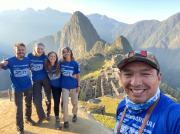
Alyssa
Incredible experience and will never forget!
Dayvis is the best tour guide. He is super nice, very knowledgeable and very accommodating! The whole SAS trek team is incredible and highly will recommend to all my family and friends! It was my birthday and they even baked me a cake with what they had, it meant so much to me! Appreciated all the cooks, porters and especially our guide Dayvis. We are so thankful for SAS !!
Nikki W
Best Salkantay Tour Company!!
SAS went above and beyond in every way for our 5 day salkantay trail! Best trip ever! Highly recommend this company for the best service and experience.
Roger, our tour guide made every moment so special full of knowledge sharing, laughter, and positivity. He brought us on special add on hikes and excursions that were incredible. Oscar, our chef, prepared literal feasts for every meal that were all delicious, unique, and nourishing. Other tour groups were salivating when they saw the food we were served. Elias, quickly became our friend with morning tent wake-ups with cocoa tea, his huge smile, and incredible service for camping and meal time. All of the staff was incredible and made our experience feel like “glamping” in the most beautiful Peruvian Andes scenery.
Jonathan, made planning this trip so easy with quick responses and extreme flexibility when we had to reschedule to 2022 after the 2020 surprise pandemic interrupted plans.
It should also be noted that during our trip there were strikes going on that led to blockades around Cusco, making it difficult to get to the trailhead on day 1. However, our SAS team was the only tour company that found a way for us to begin the trip on time with commitment and creativity. We are so thankful for SAS!!
DeBbie K
Amazing 4d/3n classic Inca trail.!
I just finished hiking the 4d/3n classic Inca trail with SAS and would absolutely recommend this company. Communication was great from start to finish - even before my friend and I booked the tour, Jonathan was extremely responsive and helpful in answering all of our questions.
On the hike, our tour guide Deyviss was extremely knowledgeable about the history and culture of the Inca empire. He was also very accommodating for the varying fitness levels in our group, even helping me carry my backpack when I got really bad altitude sickness on the second day. Elias, the porter team, and the chef were also phenomenal, running ahead of us to ensure everything ran on schedule.
Overall, this was an amazing experience and I really enjoyed hiking with Deyviss and team!
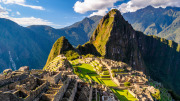
John M
Sacred Valley plus Short Inca Trail.!
Just finished the Sacred Valley plus Short Inca Trail 3 Days/ 2 Nights Tour. The tour was incredible and more than covered everything in the prospective. But what really made the trip was the office staff and the guide. The personal attention from the Cusco office staff Jonathan as he setup the trip just as we requested including getting tickets to Huayna Piccho Mountain at the time we wanted and arranging for airport transport and Covid testing. I had a few special needs due to age and allergies, and he made sure that they were addressed.
Our guide for the 3 days, Danny Ramirez, was both an expert guide with a deep knowledge of Inca and Spanish culture as well as the local flora and fauna, but also a personal coach, encouraging me forward yet giving me space to enjoy some of the most spectacular scenery on the planet. It was a real privilege for me and my family to spend 3 days with him. Thank you.
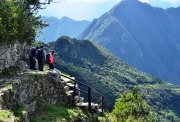
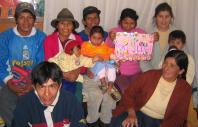
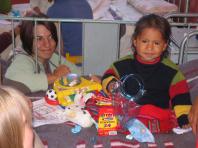
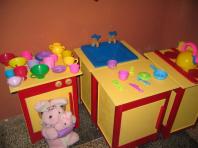
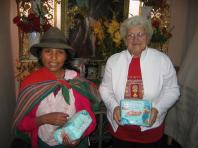
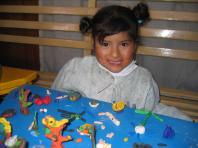
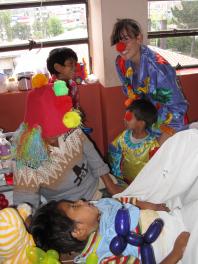
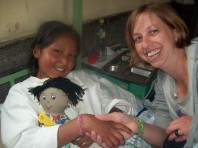
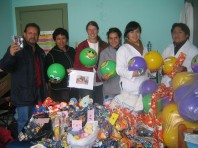
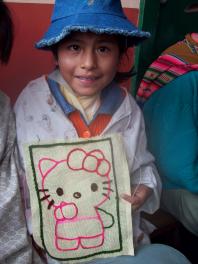
Leaving Frequency
3-4 afternoons a week
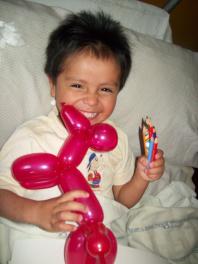
Please Note
There is no charge to visit the people with us but if you could fit a second hand toy or childs jumper or warm baby clothing or a second hand picture book in your pack it would be a kind gesture. You want to ensure you leave space for that alpaca jumper you are going to buy in Cusco or other souvenirs so reduce your personal luggage a little and bring something for someone in crisis and improve it a little for them.
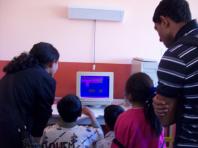
Overview
Flowers of Hope small film
you need to look in the June 2009 blog
http://cusconews.blogspot.com/
2009_06_01_archive.html
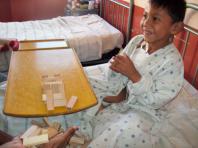
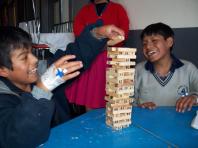
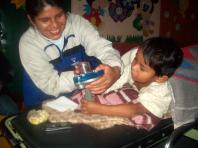
Briefing
HOW IT GOT STARTED ?
The Hospital Volunteer Program emanated from a search to utilize excess donations that had been received for the Wawa wasi, a simple program designed to provide care and assistance for poverty-stricken children and their families.
An announcement on the radio highlighted the sorrowful conditions that child patients were experiencing in the Regional Hospital; feelings of extreme loneliness, boredom and depression. It was thus decided upon hearing the advertisement that the children at the Regional Hospital would be the perfect recipients for the excess donations. A hindrance at Administration led to a switch in location, and a trip to visit the children in Antonio Lorena Cusco Hospital ( named by decades as Hospital de los Pobres) during visiting hours was alternatively arranged.
Children in the Pediatrics Unit were each given the simple gift of ten pictures with pencils and crayons, which markedly impacted upon their mood, spirit and state of well-being. The simple activity of colouring-in brought enjoyment and animation to what were many cheerless faces, inspiring what began as a one-off act to become a regular monthly visit.
Children from the Wawa wasi brought the programs toys to engage in collective play the children at the hospital, turning out to be a two-fold beneficial experience. Through their own initiative, and despite their own destituteness, the children from the Wawawasi learnt the valuable concept of outreach; of doing things for others.
It was thus decided that the hospital visits would take place regularly, extending also to the burns unit in the Regional Hospital.
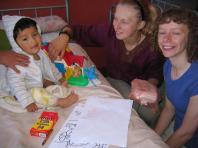
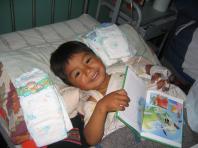
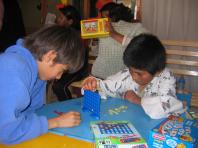
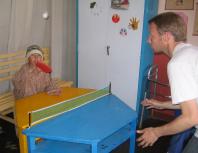
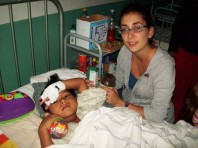
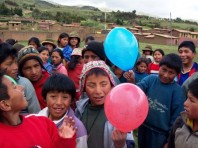
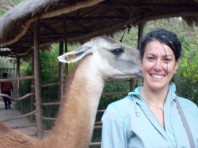
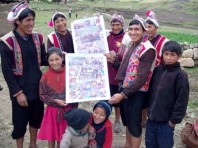
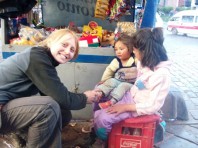
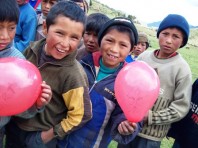
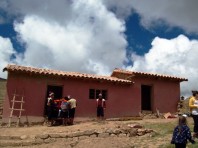
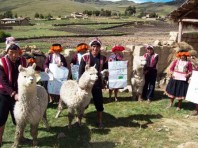
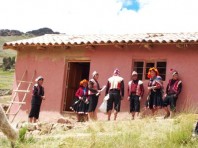
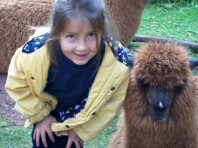
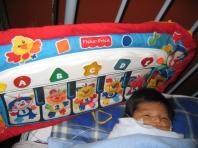
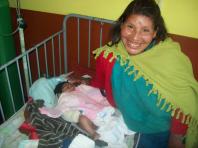
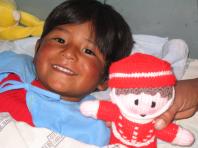
You are here: Cusco: More than just Machu Picchu, the real Peruvian family -our people from Andean Communities. > Hospital patient support project at Regional and Lorena Hospitals.
Hospital patient support project at Regional and Lorena Hospitals.
THE HOSPITALS of the POORS in CUSCO.-
Both the Regional Hospital and the Antonio Lorena Hospital are hospitals for people who do not have insurance and unemployed. They are therefore often filled with people from the Provincias, the poor mountain areas and communities. These communities are generally self-sufficient farming communities that often work on a trade and barter system, meaning that for the most part, families from these areas do not have the money required to buy medications and treatments for their children in hospital.
Additionally, because their communities are often a great distance away from the hospitals, children in the hospital are often alone for long periods of time, as parents need to either work, or take care of their other children. Children in the hospital are thus left needing emotional, psychological and financial support as family support is at times quite minimal.
Most children admitted to the Burns unit have boiling liquid burns but others commonly require even greater assistance as the fires from which they have acquired their burns have often destroyed their homes and possessions.
PROGRAMS AND ACTIVITIES.-
A number of activities take place within the Hospital Volunteer Program to facilitate healing and rehabilitation, as well as to bring both emotional and physical relief to both patients and their parents.
Activities and games have been designed to stimulate developmental skills, reduce fear and stress levels amongst patients, and to encourage and stimulate a full range of movement of areas that have encountered burns or damage. Most importantly, the program aims to provide an environment for both patients and their parents that allows for support on an emotional level. By providing a range of activities, whether it be playing with toys or colouring-in to sewing or balloon volleyball, the program aims to not only lift the spirits of patients, but also to create an atmosphere in which the anxiety of being in both a hospital and in pain can be averted.
Art projects both stimulate patients to use their creativity whilst lifting self-esteem levels as their completion often leads to a feeling of great personal satisfaction and growth. In addition to providing relaxation and much laughter, specific activities suited for exercising wounded areas are incorporated to specifically stimulate a full range of movements to those areas that have been badly burnt or wounded, to ensure restorative movement of the area once discharged.
Activities that often take place include:
- Colouring-in, playing with toys, reading books
- Art projects: making of cards, sewing, items for patients to take away
- Physical activites: balloon volleyball, table tennis
- Developmental skills games: Maths or English based
HUMOR THERAPY.-
Research has shown that there are many benefits of laughter, ranging from strengthening the immune system to responding better to medical treatment.
Laughter triggers a number of physiological and emotional responses that prove to be beneficial for patients, including:
1.-General increase in activity of the immune system.
2.-Reduction of stress hormones that constrict blood vessels and suppress immune activity such as cortisol and epinephrine.
3.-Increase of health-enhancing hormones such as endorphins and neurotransmitters.
4.-Provides a workout for the diaphragm and increases the body’s ability to use oxygen
5.-Provides a physical and emotional release.
6.-Brings the focus away from anger, guilt, stress and other negative emotions, thus is a powerful distraction.
Most importantly, laughter allows for interaction and connects us with others. One of the main goals of the Hospital Volunteer Program is to elevate the mood of those who are in some way suffering, and bringing laughter into their lives is one way in which we can easily do so. Perhaps the biggest benefit of laughter is that it is free and has no negative side-effects, as well as being contagious making it doubly beneficial!
TOYS.-
In Peru, there are many intrusions on a child’s play life. Yet play offers children many an invaluable opportunity. It is through play that children learn about themselves and the world, and by using toys as learning tools, children are able to acquire new skills and practice old ones. In addition, play encourages independence, self-esteem, creativity, and is a great outlet for pent-up energy and emotions. But most importantly, play offers the reward of fun, a delightful experience for all children, especially those who are unwell.
It is for this reason that a ‘playroom’ has been set up in the Antonio Lorena Hospital within the pediatrics unit using a very kind monetary donation. Within this room, a number of toys and activities are available for children to play with. The toys are not designed to be gifts for the children to take away with them. Rather, the toys are available for all children to play with during their stay in hospital. In this way, children are encouraged to share, interact and to play with others.
There are however, colouring-in pages, magazines and pictures that are available as gifts for children, to use whilst in hospital, and to take home with them once their stay is over. These items will be re-stocked so that they are always available for children to utilize and enjoy.
Whether playing alone or with others, quietly or with enthusiasm, play offers children an entertaining and enjoyable distraction, whilst allowing for interaction and connection with others.
In the Burns Unit, the loan of toys is common as children often spend months healing and undergoing numerous skin graft operations and other surgery. It is still explained that the larger toy items are property of the program and to be shared over the weeks with other patients. Antibacterial gels are used when necessary to minimize cross infection of bed bound children.
Of course some items that have been kindly donated are given as small gifts to children who are obviously not as fortunate as others and donations of clothes are also distributed here. Simple meals are also provided on infrequent occaisions to some of the poorer people accompanying patients. Generally those from mountain areas do not have money to purchase meals in Cusco and so hunger becomes another obstacle for them in caring for their child or younger sibling.
MEDICATION PURCHASES.-
Within the burns unit of the Regional Hospital, all patients require antibacterial cream and spray to facilitate healing and reduce the chances of infection. Unfortunately, SIS ( Peru –Seguro Integral de Salud),
established to assist patients and their families with financial dificulties, do not supply the medications prescribed by doctors for burns patients. Only a lesser quality alternative, AN, is available, which burns when applied thus causing discomfort, and is not actually permitted by doctors for usage by the patients.
The cost of recuperation for burns patients places a huge economic strain and financial burden upon them and their families. Loss of property, extreme poverty and the breakdown of families are common consequences as patients struggle to find the financial means to support their recovery and medication costs.
Most patients end up going without medication as it is virtually impossible for people from the Provincias to make the required amount of money to cover their costs. Additionally, there is a lack of assistance and information pertaining to where patients can purchase medications for the cheapest cost.
Over a year and a half ago, it was noticed that a child within the burns unit was highly unlikely to obtain medication required for his healing. Initially not set out to be ongoing process, medications were purchased for the child, which dramatically improved his recovery status and reduced the risk of infection.
As of now, all monetary donations received go towards the purchasing of medications, what would otherwise be a huge expense for patients and their families, with at times 4 large bottles of creams and sprays purchased per month. These medications are often shared between two patients to ensure that as many patients as possible can benefit from their availability.
2009 thanks to an accumulation of donations we now buy medicines in bulk directly from the supplier in Lima as we still have not been able to persuade the hospital to do this and include them in their program of free or discounted medicines. We provide these medicines free to those who do not have the financial resources to buy them for people to assist them to buy them and so their child would go without these necesary medicines.
Christmas 2009 Thankyou to Siska and Roos who with their donation we installed a treasure chest of toys and acitivites to use in Trauma unit of Regional Hospital. Beautifully painted and the centre of attention of all the kids and adults!
Recent news March 2010
Nelly, the psychologist in Regional Hospital Burns unit who so kindly lent us her hospital consultorio room and gave us a key (since everything in it is our project resources and we want her to use them as well to be able to care for the children and families) This month we found out that she is no longer working there but instead at Antonio Lorena. There is now no psychologist in regional Burns unit and still the hospital does not fund physiotherapy in the unit. That has to come through an ONG and is terribly insufficient for the huge need. I understood that since sadly Nelly no longer worked in the Burns unit that the room would be given to another purpose since already many times it had been threatened that it would be needed for "hospital business"!! .
I met with Dr Mario Cornejo, the Head of the Burns Unit as I am wanting to organise for people to supply blood donations that will be kept and coordinated by him to use for the very poor who can not afford to replace the blood used and are not able to have family donate as they come from Malarial / Yellow fever areas. He is organising for me to donate in safe conditions and any volunteers I find who would like to also do so he is setting it up so that it will be smooth process for them!
He is absolutely inspirational and he runs a clinic in San Sebastian as well as the surgeries he performs in Regional and is providing free surgery for families of children with cleft lip who can not be operated on by the state. All he asks is that someone pays the anesthesiologist and he provides the clinic and surgery. I asked him about pushing the admin to buy medinces and sell them at a more reasonable price to the patients and he said he will take it to the admin meeting.
Then I added, "don`t worry I realise that Nelly is not here and we will move the things out of the room " and he said "why ?"
He is giving us the full use of the room so instead of reducing our activities we can do so much more!
Thankyou to all who support this small but important project.
Sincerely
Robyn & David Quintana.
Advocating and getting parents to ask for their rights.-
One of the more challenging objectives in 2009 has been seeing the many injustices in a system that is suppose to be providing medical assistance to poor families but often does not give true consideration or even information to the parents. Many times families are expected to find the money for expensive medications and procedures and not giving a plan of expectations or even communicating the true state of the child`s condition. Often parents are told to purchase medications but not told where, or how much to expect to pay and then after searching anxiously for hours find that they don`t even have the money to pay for them. Parents are anxious and repeatedly told to just wait at times for days and or weeks.
I have tried to help some parents, who are particularly humble and timid in Peru, to continue to request info on their childs condition when the lack of communication is obvious and worrying. What the tests are for and the medications, probable time it will take to see a change in the childs condition if the medication has a positive desired effect. What they can do to help and prevent a reoccurrence in certain situations. To be treated as equals in the childs healing process and be informed. To seek out assistance from allied health in the hospital of which there is very little, but hopefully this will put more pressure on the medical staff to share information. I have seen children get much worse and die while “waiting” and so have many parents and so their concern but also their motivation is growing to speak out and advocate on behalf of their defenseless child. There are many beaurocratic barriers that make resolving problems difficult but to just accept them and not work even harder to rise above them to save a childs life is not good enough. This has caused uncomfortable moments with some staff but admiration and respect from others and even though it is difficult it could save a life and for this parents are grateful.
This of course is not part of the expectations of volunteers,.. but may be observed if you are with me (Robyn) and so only fair to let you know of this reality. But remember we are mainly there to help the kids have fun, relax and laugh and take back some control over their environment to help them heal and reduce further psychological stresses. So join us and have fun and help a child know they are cared for !
2010 The New Dialysis Unit at Antonio Lorena.-
We were sad to see Nelly transfer from the Burns Unit as once again there is no psychology presence but her work now in the new Dialysis Unit has brought us a new challenge.
I thought that Burns was one of the most difficult situations and then I met the people who need dialisis to keep them alive week by week. The unit is new and still has processes to be approved to try and get funding for medicines, vitamins and other necessary items which currently are an extra burden carried finacially by the patient. The Dialysis Unit at Antonio Lorena provides this service for people from 100s of kms away as there is no other service closer to them. Without it they will die as the possibility of recieiving an organ transplant here if you don´t have plenty of money is so minimal that for many it is not even a hope. Their stories are heart breaking and I want to share one with you so you will be aware of such a need for compassion.
Marcelina is a woman who desperately needs a double kidney transport. She is so sick now that the trip to the dialisis unit each Thursday nearly kills her. Her husband accompanies her each Thursday. He has a throat tumor. They have no family. Their only 2 children died.
They live in a poor community high up above Sicuani. The transport from their community is 15 soles down to Sicuani when they can find some as there are no public combis. From Sicuani to Cusco is approximately a further 4 hour drive for them. 6 soles each.
They arrive exhausted to Cusco and walk to the unit from the bus stop as they do not have any money left for such luxuries as a 10 minute local bus.
By the time Maricelina has finished 4 hours of dialysis she is totally exhausted. They have no money for food and her diet is so strict due to her illness that options are so restricted.
They make there way home the same day leaving the hospital at approximately 4pm as they have no where to stay in Cusco. Often when they get back to Sicuani they have to walk up to their community if there is no transport or they have no money. They have arrived after midnight some nights.
Most Dialysis patients come twice a week. Once a week is beyond the finacial resources of this couple and yet has to be done to survive. They live off the land, subsitent living, bartering potatoes to trade and rarely make any actual money from sales to use for the weekly transport fares. They live in freezing conditions.
Marcelina´s husband painstakingly saved the 150 soles required so he could have the tumor in his neck that started bleeding into his throat attended to. If anything happens to him noone can assist Mariano to the hospital. The day he had enough money he brought it with him to the clinic and as he assisted his wife off the bus in San Pedro station thieves pushed through and robbed him. They arrived at the clinic in tears and the staff also felt devastated as they do not have resources to help these people. Part of a donation made by 2 girls who visited the Burns unit in 2009 was given to them and again they broke down in tears. But tears of relief. There journeys will still be far more than they can afford, their daily struggle more than I could bear..but this act of kindness gives them hope and the people here are so resilient that I feel ashamed, when I remember their joy at this small gesture amongst all their struggle.
The sad thing is that this is not an uncommon story. It is not exceptional, it is tragically shared by many.
The other issue that has arisen and shows how when there is no clear coordination between the hospital and state insurance "SIS" the economic burden has to be suffered by the patient and their family. The staff called us in June to explain that SIS would no longer cover the cost of dialysis sessions and the equipment for each person needed to use with the machines such as needles, tubes, heparin and filters and that without payments to cover their costs they would have to be turned away from the Dialysis unit which effectively meant to die.
A lot of this is due to a new unit being set up and money from the govt not yet clearly coordinated and the hospital unit not feeling confident in that money spent for SIS patients will be reimbursed to them. This is partly due to the issue that money usually takes min 4 months to get back to the hospital when SIS processes the claims and there is no money until this happens. They are always working froma point of debt and fear so it is hard to be compassionate. It took about 6 weeks to understand all this as we said we would support the patients but that we would investigate all this and if it was true that SIS after showing these patients that they could be kept alive, was then just going to take away all funding then we would let people know what was going on so they could be assisted with monetary support. The staff who were sincerely concerned for their patients said yes please let people know as we can´t do anything if the maintenance is not paid for.
Dialysis in effect is instead of your kidneys cleaning out all the toxins in your blood, you will have a machine doing that for you. The kidneys work by taking all of the blood in your body and cleaning it. Whatever your body does not need, you pee out in the form of urine. This includes waste products. As your kidney function deteriorates to 10%, your kidneys are no longer able to filter all your blood effectively and toxins start to buildup in your system and if you do not get assistance in the form of dialysis or a kidney transplant you will die. People would generally have this twice a week and most people with dialysis in western countries can live a good quality of life. However here due to situations such as poverty, malnutrition and long travel distances many people can only make 1 session a week and once again there lives are so much harder. We learnt almost everything through confusing meetings and learning the stories of each individual. It has taken many difficult hours but getting to know some of the many patients has more than ever inspired us to advocate for them.
We chose 5 people in particular after Elias, 19 years old, died due to the complications of poverty on illness. We put priority on the younger patients especially those who have young children who they long to be able to support better. One is a single mother and so if she dies without trying to assist her, she leaves a young son alone who will feel failed by his country and live with resentment rather than hope.
As we tried to find out what exactly was the situation we were told different things from every side and realised it was partly as things were still evolving, it wasn´t just all lies.
We learnt that the cover would not stop altogether, it would be just a gap while patients were reviewed to see if they still needed dialysis. It seemed unnecessary in the case of these patients as they had total double renal failure so would require dialysis for the rest of their life since a kidney transplant is not in their future. This review is effectively just a lot of paperwork that has to pass through Lima to be authorised but was taking a long time when the patient has to pay for each session which works out to be a total cost of nearly 170soles each time. minimum wage here is 650 soles and very few people make this but these patients lost their jobs a long time ago due to their illness and so these costs are extremely difficult to cover and the stress on someone when they know their life depends on it causes them to decompensate even quicker.
These delays seemed to be unjust complications and after 2 other patients died we took 4 patients together to the main SIS office to ask them to clarify what was really expected. When the gentlemen explained that the gap that was to be covered by the patients was 1 to 2 weeks max I asked if he had anything in writing. Some of these patients had been without cover for 5 weeks already. So reasons moved more into difficulties with what paper work was expected and the hosptial staff needing more clarification and education with this. The investigations caused meetings to be called between Hospital and SIS and patients and although very stressful it did get things moving and finally after about 15 contacts with SIS and paying for their sessions each week with donations by the end of Sept all the patients were covered again for another 39 sessions. So we all breathe a sigh of relief and believe that many things have been clarified to make the next gap for patients quicker and less stressful.
However, I believe all the stress was too much for dear Norma, incredibly malnutirtioned, also only 19years old and a single mum. She died on the 3rd of Oct and left her small son to be looked after by her mother who had indeed being looking after both of them and fighting for her life since it all began. Dialysis is a very difficult, sad and seemingly hopeless situation for patients to face and even though it seems in the end they will all die with complicating issues, these people shouldn´t be left to die without compassion much earlier than necessary merely due to economic issues. We have set up a weekly oportunity for them to make small craft items such as bracelets, toys to give them a small income and more importantly a creative purpose and social support group. When you meet these people outside of the Dialysis unit you could mistake them for anyone else and never believe that if they missed their dialysis for a couple of weeks they would get so sick they would probably die. They deserve respect for their immense courage and resilience and dignity and support economically, emotionally and spiritually.
Apart from monetary donations, your clothing donations received are passed on to people in their situations as well to clothe their children and we are taking prepared food to strengthen families for their journey once a week.
If ever anyone is interested to visit the Burns unit or trauma units or Dialysis unit to be able to directly provide some relief then we can take you and accompany you to be able to do this directly. Whether it be a small donation to assist endless financial burdens for transport costs or medicines or treatment sessions or just something you have bought with you to let people know they are cared for. Everything is appreciated. Never think that it is no use doing something small. We built this Hospital project on the idea that if every one makes some small act of compassion there will be so many more people helped than if everyone just says it is not worth even trying as the impact is too insignificant
The people we meet are not only very poor but they are facing a crisis at this time. I believe that many of our "poor" people will be fine even in very simple difficult daily living situations but when they face a crisis and noone helps this is when the financial burden brings so much stress, acusations of blame, tears families apart and makes people loose faith in others and life. They are left to bear too great a burden alone and so anything that can help a little has a significant impact at the time. Even just a genuine kind word and a prayer.
SAS Travel Peru Direct Operator & Locally owned. Quality Tours with a special personal touch !!!
Inca Trail, Tours to Machu-Picchu, Alternative Treks & Jungle Trips.
Office: Calle Garcilaso 270 (near Marqueses Hotel) CUSCO
Movil/WhatsApp: +51 984 652232 (David) / +51 984 673 124 (Janet)
Office Phones: +51 084 256324 / +51 984 705090 (Margo) 24/7
www.sastravelperu.com [email protected] [email protected]
Office Hours: Mon to Sat: 8:00 am to 7:00 pm - Sun: From 4:00 to 7:30 pm
Highly recommended by:
Trip Advisor: Winner Certificate of Excellence

We Accept:


"Twenty years from now you will be more disappointed by the things that you didn't do than by the ones you did so. So throw off the bowlines. Sail away from the safe harbor. Catch the trade winds in your sails." "Explore. Dream. Discover." Mark Twain
Life is a Collection of experiences... let us be your guide...!!!
SAS Travel is supporting many of the community projects run by Hotel Marqueses: Eg. "Cusco Hospital Regional Project", "Walk a Mile in my shoes", "Shoes shiners boys" If you are coming to Cusco please make a space for a couple of second hand clothes, shoes especially for kids, school equipment, toys and drop them off in our office. We will help distribute the items to people who really need them in small village schools and communities in the mountains of Lares, Amaru Choquecancha, Sacaca, Pampallaqta, Paru Paru. Thank you.
MARQUESES Boutique HOTEL is a beautiful Colonial Casona built at the end of XVII century that has recently been refurbished and renovated according to the modernity and comfort, designed for couples, families and are waiting to welcome you. The ancient stone fountain, the woodwork of balconies and doors, the colorful andean weavings and the classic paintings from the famous paintings of Cusco´s school… adds so much to its own appeal. It is great value for a lovely and safe staying in Cusco. An amazing history going back 400 years is great for classic photos. Hospitality and service are waiting to welcome you!.
Located at Garcilaso Street N° 256 (near SAS Travel.) Cusco Peru
www.marqueseshotel.com
Copyright © 1990 - 2025. SAS Travel Peru (Adventours SAS & Marquez Viajes). All Rights Reserved.






